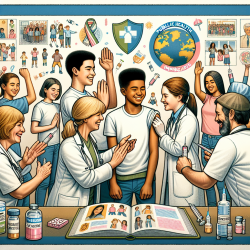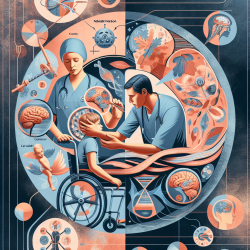Rubinstein–Taybi Syndrome (RTS) is a rare genetic condition characterized by distinctive facial features, broad thumbs, and developmental delays. However, recent research has delved deeper into the behavioral aspects of RTS, providing valuable insights for practitioners working in educational settings. The scoping review by Awan et al. (2022) sheds light on these behavioral characteristics and offers actionable recommendations for improving practice.
Key Behavioral Characteristics of RTS
According to the research, individuals with RTS often exhibit:
- Repetitive behaviors
- Intellectual disabilities
- Heightened sociability
- Autism-like characteristics
- Mental health challenges
Understanding these traits is crucial for developing effective interventions and support strategies.
Actionable Recommendations for Practitioners
The review highlights several practical steps that practitioners can take to better support students with RTS:
1. Individualized Education Plans (IEPs)
Tailor educational goals and interventions to address the unique behavioral and cognitive needs of each student. Incorporate strategies that mitigate repetitive behaviors and support intellectual development.
2. Multi-Disciplinary Approaches
Collaborate with a team of professionals, including psychologists, speech therapists, and occupational therapists, to provide comprehensive support. Multi-disciplinary studies combining genetic and psychological expertise can offer a more holistic understanding of RTS.
3. Mental Health Support
Given the prevalence of mental health challenges, integrate mental health support into the educational framework. This could include counseling services and behavioral therapy to address anxiety and other psychiatric issues.
4. Social Skills Training
Enhance social interaction skills through targeted training programs. Encourage peer interactions and provide opportunities for students to practice social skills in a supportive environment.
Encouraging Further Research
While the review by Awan et al. provides a solid foundation, it also identifies gaps in the current research. Practitioners are encouraged to engage in or support further research to:
- Explore the effectiveness of various interventions
- Understand the long-term outcomes of individuals with RTS
- Develop standardized measurement tools for behavioral characteristics
By contributing to ongoing research, practitioners can help build a more robust knowledge base that will benefit future generations of students with RTS.
Conclusion
The insights from the scoping review on RTS can significantly enhance the skills of practitioners working with this unique population. By implementing individualized education plans, adopting multi-disciplinary approaches, integrating mental health support, and focusing on social skills training, practitioners can make a meaningful difference in the lives of students with RTS. To read the original research paper, please follow this link:
The behavioral phenotype of Rubinstein–Taybi syndrome: A scoping review of the literature.










